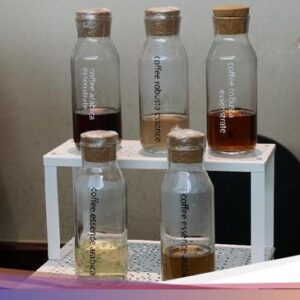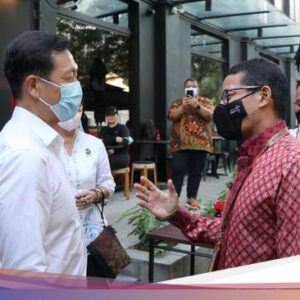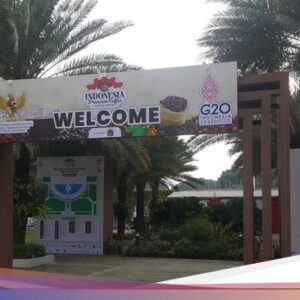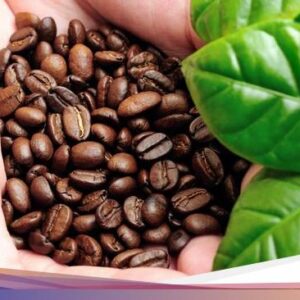Banyumas – At this hermitage you can learn about coffee plants until post-harvest. The location is comfortable and cool at the foot of Mount Slamet.
Coffee grown in each region definitely has its own characteristics, as does coffee on the slopes of Mount Slamet, specifically in Peninis Hamlet, Windujaya Village, Kedungbanteng District, Banyumas, Central Java. Long history coffee in Banyumas cannot be separated from the Dutch colonial era.
However, in Central Java itself, coffee from Banyumas is almost unknown to the wider community and is not included in the Indonesian coffee map. Like coffee from Temanggung or Wonosobo. In fact, Banyumas was originally a coffee commodity producer, long before there was sugar and cloves. However, currently coffee from Banyumas is starting to grow again, and market interest is starting to open up.
ADVERTISEMENT
SCROLL TO CONTINUE WITH CONTENT
Also read: Melung Village also has legendary coffee with a unique taste
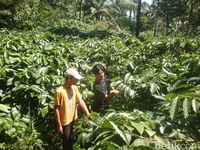 Photo: doc. detikFood/Arbi Anugrah Photo: doc. detikFood/Arbi Anugrah |
“Why is it (coffee) lost in Banyumas? Maybe it’s because knowledge about maintenance and cultivation was cut off after the Dutch left and didn’t leave the knowledge, so here the knowledge is lost and doesn’t reach the community. In contrast to the Temanggung and Wonosobo areas where there is Banaran coffee managed by PTPN IX, ” said Edi Daryono (40), Founder of Padapokan Filosofi Kopi and Pondok Tani Organik, Yasnaya Poliana when talking to detikcom, Thursday (27/9) yesterday.
Edi himself was born into a family of coffee farmers and lived in the Banaran coffee area, when he first started developing coffee in Banyumas 20 years ago by accident. It started with the sadness of seeing coffee trees cut down by local residents just to make firewood. After he bought the coffee tree trunks, he then planted them until they produced coffee as it is currently growing with a coffee land area of up to 1.5 hectares.
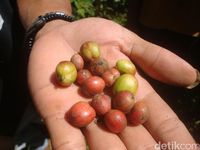 Photo: doc. detikFood/Arbi Anugrah Photo: doc. detikFood/Arbi Anugrah |
“Initially developing coffee here was not on purpose, because I was excited to see coffee trees on the side of the road being pulled up, piled up and then the wood wanted to be made into torches (firewood) by local residents. Even though the stems were as big as a hand, how come they were burned, in my area it was already possible. produces 15 kilograms of coffee beans per tree, and that’s a life, finally I bought it and planted it in this hermitage, 6 months later I planted the shoots, after 1 year it had fruit. That’s what it is now, so it started from being sick by accident but it can become “Hopefully it will be a blessing for Banyumas,” he said.
Banyumas itself has plains ranging from 200-1500 meters above sea level with fertile soil and not much contaminated by chemicals, so the coffee produced has a very unique and complete taste. However, the coffee produced on average is coffee from the Robusta variety, although a demonstration plot for Arabica variety coffee is currently being developed in the Baturraden area.
“If it already has robusta, because the land in Banyumas is fertile and there hasn’t been a lot of chemical contamination, the taste is more savory, chocolatey, nutty, and the caramel is complete so it’s balanced. So it’s extraordinary, that’s why the aroma has spices too. Then here there is the language of ‘bouquet’ and There is a bouquet in coffee, that means the taste is complete coffee “Banyumas is delicious, delicious is not just delicious but really and truly delicious,” he said.
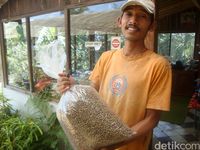 Photo: doc. detikFood/Arbi Anugrah Photo: doc. detikFood/Arbi Anugrah |
According to him, Padapokan Filosofi and Pondok Tani Organik Yasnaya Poliana are more about assisting coffee farmers so that they can produce coffee of very good quality.
From this assistance, currently many coffee farmers in the Banyumas area have started to be able to release coffee from their respective regions, such as in Sumbang Village, Suhuat Village, and Tambak Village with ‘Gowok Rangkok’ coffee. And he hopes that the hermitage, which also has the Maju Desa Indonesia farmer group, can become a pioneer for everyone in the villages who want to learn about coffee.
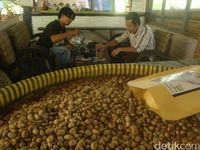 Photo: doc. detikFood/Arbi Anugrah Photo: doc. detikFood/Arbi Anugrah |
“So it’s not just cultivation, but farmers have now stepped into the post-harvest process, starting from the drying process, the post-harvest drying system, because now in shops the baristas want taste, not just just coffee, but they want a different taste. “It comes from farmers starting from post-harvest processing. That’s why farmers must be able to start from cultivation to post-harvest processing, so they are required to do that so that the price is good, the quality is good,” he said.
He is confident that in the next 1-2 years Banyumas coffee will have good quality, because of the potential of coffee in Banyumas, farmers who are starting to be smart and the market that is waiting. Not to mention, assistance and collaboration with the Banyumas Regency Agriculture and Plantation Service for 2019 which will focus on two local potentials, namely coffee and coconut sugar.
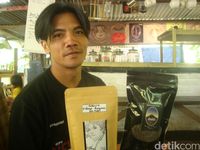 Photo: doc. detikFood/Arbi Anugrah Photo: doc. detikFood/Arbi Anugrah |
“All the land in the Mount Slamet range has potential that can be cultivated and managed with coffee, because it has been there (for a long time) just need to be rehabilitated for a year and harvest. In Banyumas there is still a lot coffee Robusta variety with local Javanese clones which have small seeds, which are actually tasty but are not yet included in international standard standards because there are size standards. “That’s why in mentoring we have to direct farmers,” he said.
On 1.5 hectares of land in the Filosofi Kopi hermitage, the coffee produced is branded as Asoka coffee and Peninis coffee which are taken from local farmers in Grumbul Peninis, Windujaya Village. Also on that land, farmers who take part in assistance can see how to develop and maintain good coffee trees so they can produce quality coffee beans.
Also Read: Also Read: Melung Banyumas Village Develops Tourism Potential
Also watch ‘Enjoying Traditionally Processed Coffee in Kemiren’:
[Gambas:Video 20detik]
(sob/odi)

